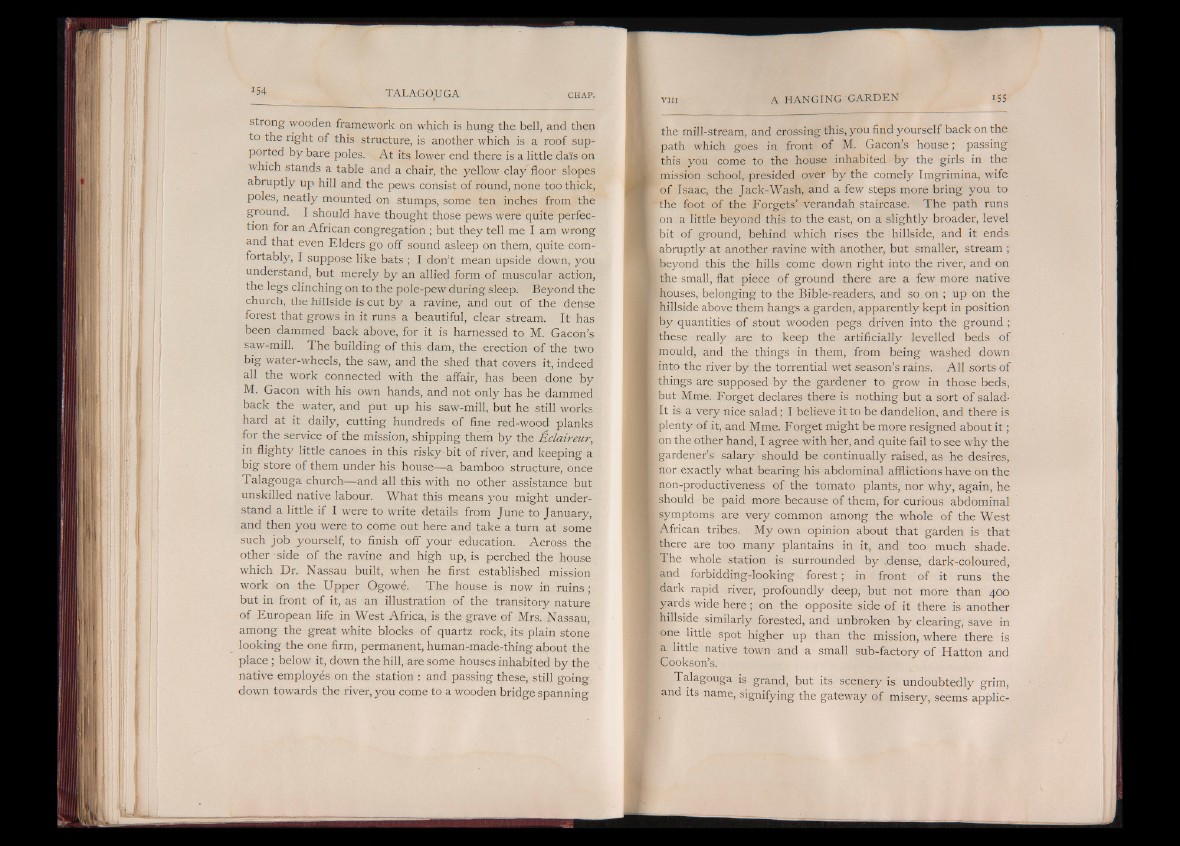
strong wooden framework on which is hung the bell, and then
to the right of this structure, is another which is a roof supported
by bare poles. At its lower end there is a little dais on
which stands a table and a chair, the yellow clay^floor slopes
abruptly up hill and the pews consist of found, none too thick,
poles, neatly mounted on stumps, some ten inches from the
ground. I should have thought those pews were quite perfection
for an African congregation ; but they tell me I am wrong
and that even Elders go off sound asleep on them, quite comfortably,
I suppose like bats ; I don’t mean upside down, you
understand, but merely by an allied form of muscular action,
the legs clinching on to the pole-pew during sleep. Beyond the
church, the hillside is cut by a ravine, and out of the dense
forest that grows in it runs a beautiful, clear stream. It has
been dammed back above, for it is harnessed to M. Gacon’s
saw-mill. The building of this dam, the erection of the two
big water-wheels, the saw, and the shed that covers it, indeed
all the work connected with the affair, has been done by
M. Gacon with his own hands, and not only has he dammed
back the water, and put up his saw-mill, but he still works
hard at it daily, cutting hundreds of fine red-wood planks
for the service of the mission, shipping them by the Éclaireur,
in flighty little canoes in this risky bit of river, and keeping a
big store of them under his house— a bamboo structure, once
Talagouga church— and all this with no other assistance but
unskilled native labour. What this means you might understand
a little if I were to write details from June to January,
and then you were to come out here and take a turn at some
such job yourself, to finish off your education. Across the
other side of the ravine and high up, is perched the house
which Dr. Nassau built, when he first established mission
work on the Upper Ogowé. The house is now in ruins ;
but in front of it, as an illustration of the transitory nature
of European life in West Africa, is the grave of Mrs. Nassau,
among the great white blocks of quartz rock, its plain stone
looking the one firm, permanent, human-made-thing about the
place ; below1 it, down the hill, are some houses inhabited by the
native employés on the station : and passing these, still goin"
down towards the river, you come to a wooden bridge spanning
the mill-stream, and crossing this, you find yourself back on the
path which goes in front of M. Gacon’s house; passing
this you come to the house inhabited by the girls in the
mission school, presided over by the comely Imgrimina, wife
of Isaac, the Jack-Wash, and a few steps more bring you to
the foot of the Forgets’ verandah staircase. The path runs
on a little beyond this to the east, on a slightly broader, level
bit of ground, behind which rises the hillside, and it ends
abruptly at another ravine with another, but smaller, stream ;
beyond this the hills come down right into the river, and on
the small, flat piece of ground there are a few more native
houses, belonging to the Bible-readers, and so on ; up on the
hillside above them hangs a garden, apparently kept in position
by quantities of stout wooden pegs driven into the ground ;
these really are to keep the artificially levelled beds of
mould, and the things in them, from being washed down
into the river by the torrential wet season’s rains. A ll sorts of
things are supposed by the gardener to grow in those beds,
but Mme. Forget declares there is nothing but a sort of salad-
It is a very nice salad; I believe it to be dandelion, and there is
plenty of it, and Mme. Forget might be more resigned about i t ;
on the other hand, I agree with her, and quite fail to see why the
gardener’s salary should be continually raised, as he desires,
por exactly what bearing his abdominal afflictions have on the
pon-productiveness of the tomato plants, nor why, again, he
should be paid more because of them, for curious abdominal
symptoms are very common among the whole of the West
African tribes. My own opinion about that garden is that
there are too many plantains in it, and too much shade.
The whole station is surrounded by .dense, dark-coloured,
and forbidding-looking forest; in front of it runs the
dark rapid river, profoundly deep, but not more than 400
yards wide here; on the opposite side of it there is another
¡hillside similarly forested, and unbroken by clearing, save in
one little spot higher up than the mission, where there is
a little native town and a small sub-factory of Hatton and
Cookson’s.
Talagouga is grand, but its scenery is. undoubtedly grim,
and its name, signifying the gateway o f misery, seems applic